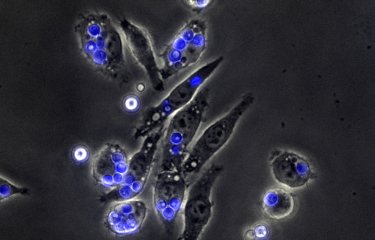According to WHO estimates, in 2015, there were 212 million cases of malaria and 429,000 deaths worldwide. Sub-Saharan Africa alone accounts for 90% of cases and 92% of deaths. In this region, the parasite Plasmodium falciparum, responsible for the majority of deaths, is the most common/frequent. Since 2010, integrated control measures (insecticide-treated mosquito nets, insecticide sprays, etc.) have significantly reduced the burden of malaria among populations at risk and the mortality rate has fallen by 29% worldwide. However, these advances are threatened by the increasing resistance of vectors to insecticides and the parasites to drugs. The development of an effective vaccination strategy therefore remains a priority for the future.
In infected persons, the parasite form that infects the red blood cells is called merozoite. Some proteins on the surface of these merozoites, MSP, are interesting targets for vaccine development because they induce antibodies blocking parasitic invasion and eliminating merozoites.
Researchers at the Institut Pasteur in Dakar, the Institut Pasteur in Paris and the IRD have been working together for several years on the validation of vaccine candidates in the context of active monitoring of the populations in the villages of Dielmo and Ndiop located in the south of Senegal near the border with the Gambia.
The results of a study conducted in Ndiop, they just published in the journal Vaccine showed that MSP4, a major surface protein of the merozoite, is a target significantly associated with clinical protection, independent of age. The protein naturally induces a strong antibody response in endemic areas, associated with an estimated 20-25% decrease in malaria morbidity. The published results also show that the specific antibodies are associated with effector polynuclear neutrophil-dependent parasite killing (Antibody Dependent Respiratory Burst), contributing up to 60% of this activity in some individuals.
The MSP4 protein is thus an interesting antigen to include into a candidate vaccine combining several targets that are currently being tested separately and whose synergy could be synonymous with increased efficacy in clinical trials.
Source:
Association of antibodies to Plasmodium falciparum merozoite surface protein-4 with protection against clinical malaria.
Perraut R(1), Varela ML(2), Joos C(2), Diouf B(2), Sokhna C(3), Mbengue B(4), Tall A(5), Loucoubar C(6), Touré A(2), Mercereau-Puijalon O(7).
(1) Unité d'Immunologie, Institut Pasteur de Dakar, Sénégal.
(2) Unité d'Immunologie, Institut Pasteur de Dakar, Sénégal.
(3) Institut de Recherche pour le Développement (IRD), URMITE, UMR 198, Dakar,Sénégal.
(4) Unité d'Immunogénétique, Institut Pasteur de Dakar, Sénégal.
(5) Unité d'Epidémiologie, Institut Pasteur de Dakar, Sénégal.
(6) Institut Pasteur de Dakar, G4 Biostatistiques Bioinformatique et Modélisation, Dakar, Sénégal.
(7) Institut Pasteur, Département Parasites et Insectes Vecteurs, 25 Rue du Dr. Roux, 75015 Paris, France.





